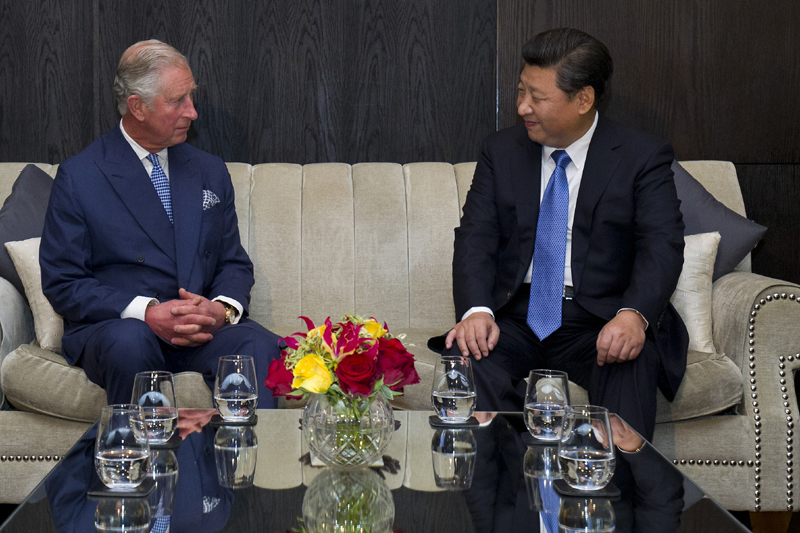UK rolls out red carpet for China's Xi on contentious visit
LONDON: Britain and China toasted a "golden age" of relations Tuesday with a state visit festooned with pomp and ceremony but overshadowed by concerns about national security, human rights and economic rivalry.
Chinese President Xi Jinping's trip, years in the making, aims to cement deals giving Britain a vast new pool of investment and China greater access to European markets. But as Xi was welcomed as an honored guest at Buckingham Palace and the U.K. Parliament, critics warned that Britain was taking a risk by courting Beijing so aggressively.
"If you act like a panting puppy, the object of your attention is going to think they have got you on a leash," James McGregor, a China expert at consulting firm APCO, told the BBC.
Some British politicians, businesspeople and union members are alarmed by growing Chinese investment in key sectors of the British economy, and by Chinese competition in areas such as steel production.
Prime Minister David Cameron is under pressure to raise the issue of China selling steel at a loss on world markets to secure its own market share, which has helped push British steelmakers into a crisis. Thousands of U.K. steel layoffs were announced Tuesday, the first full day of Xi's four-day visit.
China's leader was welcomed to London with tradition and military pomp — a genre at which both Britain and China excel.
Xi and his wife Peng Liyuan were greeted by Queen Elizabeth II, her husband Prince Philip and dignitaries including Cameron at the Horse Guards parade ground near Buckingham Palace. The Chinese leader was welcomed with a 41-gun artillery salute before inspecting ranks of Grenadier Guards in scarlet tunics and bearskin hats.
Xi was then driven to Buckingham Palace, where he and his wife will stay, in a gilded carriage drawn by white horses. Thousands lined the route along the Mall to see Xi go by. Demonstrators from human rights and pro-Tibet groups jostled with a much larger group of Xi well-wishers, whose chants of "China! China!" drowned out their rivals' shouts of "Shame!" and "Free Tibet!"
Britain's Conservative-led government has been courting China, the world's second-largest economy, for years. When Xi's predecessor, Hu Jintao, paid a state visit to Britain in 2005, the countries announced $1.3 billion in trade deals. This time, Britain said the two nations would sign 30 billion pounds ($46 billion) in business agreements.
Chancellor of the Exchequer George Osborne, a champion of closer ties, has said he wants China to be Britain's biggest trading partner after the United States by 2025.
In an interview before the visit, Cameron told China's CCTV television that this was a "golden age" of U.K.-China relations. He said Chinese investment was good for Britain and that China benefited from "having access to a country that is a leading member of the EU, and has so many other contacts and roles in the world."
Talon Li, a Chinese finance student at Greenwich University, stood with classmates near Buckingham Palace on Tuesday to wave at Xi and said he welcomed closer ties.
"It's great," he said. "U.K. and China will really help each other. They should stay friends — every British and Chinese person can be friends."
Yet economic rivalries remain. Tata Steel announced 1,200 layoffs Tuesday, just weeks after 2,200 jobs were lost at SSI's plant in northeast England.
Tata said the layoffs at plants in northeast England and Scotland were in response to "a shift in market conditions caused by a flood of cheap imports, particularly from China, a strong pound and high electricity costs."
In an emergency House of Commons debate on the layoffs, Labour Party business spokesman Kevin Brennan accused the government of being "content to allow Britain's entire steel-making capacity to disappear in the face of blatant Chinese dumping."
China also is set to build a new nuclear power plant in southwest England, and the two governments have signed deals giving Chinese money greater access to London's financial district.
The slew of deals has sparked accusations that Britain is pandering to China to secure investment. Opposition politicians are urging Cameron to raise China's human rights record in his several meetings with Xi this week.
Others caution against relying too heavily on a country whose astonishing recent economic growth is flagging. Data released Tuesday showed China eased to a six-year low of 6.9 percent growth in the third quarter after expanding 7 percent in each of the previous two quarters. Some economists, however, say this year's true rate of growth for China might be as low as 4 percent.
Foreign Secretary Philip Hammond insisted Britain was not naive and was "developing a mature relationship with the Chinese."
China's first couple had a private lunch with the queen and a tour of the Buckingham Palace Picture Gallery Tuesday before Xi meets with heir to the throne Prince Charles, his son Prince William and opposition Labour Party leader Jeremy Corbyn.
Later, Xi will address lawmakers at Britain's Parliament and attend a banquet hosted by the queen at Buckingham Palace.






